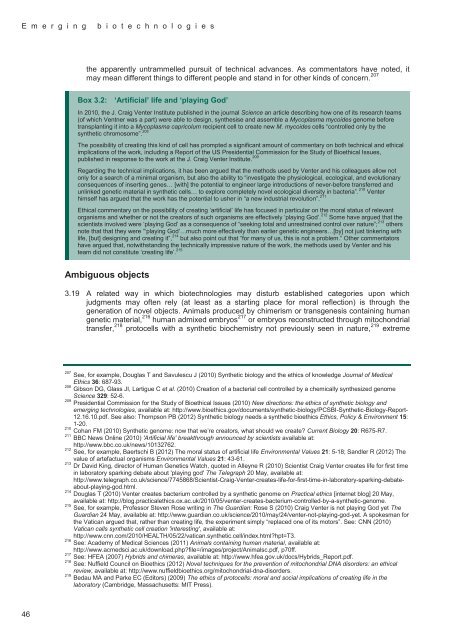Emerging biotechnologies: full report - Nuffield Council on Bioethics
Emerging biotechnologies: full report - Nuffield Council on Bioethics
Emerging biotechnologies: full report - Nuffield Council on Bioethics
You also want an ePaper? Increase the reach of your titles
YUMPU automatically turns print PDFs into web optimized ePapers that Google loves.
E m e r g i n g b i o t e c h n o l o g i e s<br />
the apparently untrammelled pursuit of technical advances. As commentators have noted, it<br />
may mean different things to different people and stand in for other kinds of c<strong>on</strong>cern. 207<br />
Box 3.2: ‘Artificial’ life and ‘playing God’<br />
In 2010, the J. Craig Venter Institute published in the journal Science an article describing how <strong>on</strong>e of its research teams<br />
(of which Ventner was a part) were able to design, synthesise and assemble a Mycoplasma mycoides genome before<br />
transplanting it into a Mycoplasma capricolum recipient cell to create new M. mycoides cells “c<strong>on</strong>trolled <strong>on</strong>ly by the<br />
synthetic chromosome”. 208<br />
The possibility of creating this kind of cell has prompted a significant amount of commentary <strong>on</strong> both technical and ethical<br />
implicati<strong>on</strong>s of the work, including a Report of the US Presidential Commissi<strong>on</strong> for the Study of Bioethical Issues,<br />
published in resp<strong>on</strong>se to the work at the J. Craig Venter Institute. 209<br />
Regarding the technical implicati<strong>on</strong>s, it has been argued that the methods used by Venter and his colleagues allow not<br />
<strong>on</strong>ly for a search of a minimal organism, but also the ability to “investigate the physiological, ecological, and evoluti<strong>on</strong>ary<br />
c<strong>on</strong>sequences of inserting genes… [with] the potential to engineer large introducti<strong>on</strong>s of never-before transferred and<br />
unlinked genetic material in synthetic cells… to explore completely novel ecological diversity in bacteria”. 210 Venter<br />
himself has argued that the work has the potential to usher in “a new industrial revoluti<strong>on</strong>”. 211<br />
Ethical commentary <strong>on</strong> the possibility of creating ‘artificial’ life has focused in particular <strong>on</strong> the moral status of relevant<br />
organisms and whether or not the creators of such organisms are effectively ‘playing God’. 212 Some have argued that the<br />
scientists involved were ‘playing God’ as a c<strong>on</strong>sequence of “seeking total and unrestrained c<strong>on</strong>trol over nature”; 213 others<br />
note that that they were “‘playing God’…much more effectively than earlier genetic engineers…[by] not just tinkering with<br />
life, [but] designing and creating it”, 214 but also point out that “for many of us, this is not a problem.” Other commentators<br />
have argued that, notwithstanding the technically impressive nature of the work, the methods used by Venter and his<br />
team did not c<strong>on</strong>stitute ‘creating life’. 215<br />
Ambiguous objects<br />
3.19 A related way in which <str<strong>on</strong>g>biotechnologies</str<strong>on</strong>g> may disturb established categories up<strong>on</strong> which<br />
judgments may often rely (at least as a starting place for moral reflecti<strong>on</strong>) is through the<br />
generati<strong>on</strong> of novel objects. Animals produced by chimerism or transgenesis c<strong>on</strong>taining human<br />
genetic material, 216 human admixed embryos 217 or embryos rec<strong>on</strong>structed through mitoch<strong>on</strong>drial<br />
transfer, 218 protocells with a synthetic biochemistry not previously seen in nature, 219 extreme<br />
207 See, for example, Douglas T and Savulescu J (2010) Synthetic biology and the ethics of knowledge Journal of Medical<br />
Ethics 36: 687-93.<br />
208 Gibs<strong>on</strong> DG, Glass JI, Lartigue C et al. (2010) Creati<strong>on</strong> of a bacterial cell c<strong>on</strong>trolled by a chemically synthesized genome<br />
Science 329: 52-6.<br />
209 Presidential Commissi<strong>on</strong> for the Study of Bioethical Issues (2010) New directi<strong>on</strong>s: the ethics of synthetic biology and<br />
emerging technologies, available at: http://www.bioethics.gov/documents/synthetic-biology/PCSBI-Synthetic-Biology-Report-<br />
12.16.10.pdf. See also: Thomps<strong>on</strong> PB (2012) Synthetic biology needs a synthetic bioethics Ethics, Policy & Envir<strong>on</strong>ment 15:<br />
1-20.<br />
210 Cohan FM (2010) Synthetic genome: now that we’re creators, what should we create? Current Biology 20: R675-R7.<br />
211 BBC News Online (2010) 'Artificial life' breakthrough announced by scientists available at:<br />
http://www.bbc.co.uk/news/10132762.<br />
212 See, for example, Baertschi B (2012) The moral status of artificial life Envir<strong>on</strong>mental Values 21: 5-18; Sandler R (2012) The<br />
value of artefactual organisms Envir<strong>on</strong>mental Values 21: 43-61.<br />
213 Dr David King, director of Human Genetics Watch, quoted in Alleyne R (2010) Scientist Craig Venter creates life for first time<br />
in laboratory sparking debate about 'playing god' The Telegraph 20 May, available at:<br />
http://www.telegraph.co.uk/science/7745868/Scientist-Craig-Venter-creates-life-for-first-time-in-laboratory-sparking-debateabout-playing-god.html.<br />
214 Douglas T (2010) Venter creates bacterium c<strong>on</strong>trolled by a synthetic genome <strong>on</strong> Practical ethics [internet blog] 20 May,<br />
available at: http://blog.practicalethics.ox.ac.uk/2010/05/venter-creates-bacterium-c<strong>on</strong>trolled-by-a-synthetic-genome.<br />
215 See, for example, Professor Steven Rose writing in The Guardian: Rose S (2010) Craig Venter is not playing God yet The<br />
Guardian 24 May, available at: http://www.guardian.co.uk/science/2010/may/24/venter-not-playing-god-yet. A spokesman for<br />
the Vatican argued that, rather than creating life, the experiment simply “replaced <strong>on</strong>e of its motors”. See: CNN (2010)<br />
Vatican calls synthetic cell creati<strong>on</strong> 'interesting', available at:<br />
http://www.cnn.com/2010/HEALTH/05/22/vatican.synthetic.cell/index.html?hpt=T3.<br />
216 See: Academy of Medical Sciences (2011) Animals c<strong>on</strong>taining human material, available at:<br />
http://www.acmedsci.ac.uk/download.php?file=/images/project/Animalsc.pdf, p70ff.<br />
217 See: HFEA (2007) Hybrids and chimeras, available at: http://www.hfea.gov.uk/docs/Hybrids_Report.pdf.<br />
218 See: <str<strong>on</strong>g>Nuffield</str<strong>on</strong>g> <str<strong>on</strong>g>Council</str<strong>on</strong>g> <strong>on</strong> <strong>Bioethics</strong> (2012) Novel techniques for the preventi<strong>on</strong> of mitoch<strong>on</strong>drial DNA disorders: an ethical<br />
review, available at: http://www.nuffieldbioethics.org/mitoch<strong>on</strong>drial-dna-disorders.<br />
219 Bedau MA and Parke EC (Editors) (2009) The ethics of protocells: moral and social implicati<strong>on</strong>s of creating life in the<br />
laboratory (Cambridge, Massachusetts: MIT Press).<br />
46
















